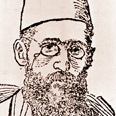
Keeping Hebrew Israel's living language
Preserving Hebrew language in today’s climate of globalization, Americanization is not as easy as one may think
Google Israel honored Ben Yehuda by creating a special Google "doodle" in memory of the man, who believed that the “Hebrew language can live only if we revive the nation and return it to its fatherland.”
Born into a family of Chabad Hasidim in Lithuania in 1858, Ben Yehuda went on to study at the Sorbonne in Paris and moved to Jerusalem in 1881, where he worked as a teacher, journalist, newspaper publisher, lexicographer, and a coiner for Hebrew words, for which he is most well-known.
Ben Yehuda invented hundreds of Hebrew words including the words for doll, bicycle, towel, ice cream, and dictionary – "milon." He also compiled the first modern-Hebrew dictionary.
Before Ben Yehuda, the Hebrew language had still been used by Jews from different communities across the world, from Russia to Yemen, as a form of verbal and written communication, at least since the Middle Ages.
Many Jews were able to read Hebrew texts, prayers and the Bible throughout the centuries, and much of Ben Yehuda’s modern Hebrew was inspired by Biblical Hebrew words, as he transformed the language of holy texts into the language of everyday life.
Three years ago, Prime Minister Benjamin Netanyahu’s cabinet decided to mark Ben Yehuda’s birthday as National Hebrew Day.
2,000 new Hebrew words every year
But preserving the Hebrew language in today’s climate of globalization and Americanization is not as easy as one may think.
The Academy of the Hebrew Language at Hebrew University of Jerusalem aims to preserve the Hebrew language by distributing around 2,000 new Hebrew words each year, taking words like SMS and blog and finding an original Hebrew meaning for those words.
“In the academy, we try to fight word by word. Instead of just making an exact translation from English, we try to find an original Hebrew word that captures the meaning,” the academy’s president, Moshe Bar Asher, told the Christian Science Monitor.
Others like Haifa’s mayor, Yona Yahav, are fighting to prevent the English language from taking over both the municipality and from appearing on business signs across the city.
Yahav, who was born in Haifa before Israel became a state, has had enough with English dominating the coastal city and has banned municipal employees from using English words such as global, audition, fine-tuning, test, and project in official documents, in order to encourage Hebrew word usage.
Likewise, the Haifa mayor is trying to stop businesses from using only English signs to market their services.
It all started when Yahav went to get his haircut at his favorite barber and discovered to his dismay that the barbershop had a huge sign with the word, Hair Stylist, printed on it. The Haifa mayor asked the young owner to switch the sign into Hebrew, and when the owner refused, the mayor decided that he would start a campaign against the overuse of English in his city.
Israel has two official languages, Hebrew and Arabic, followed by English, which has a semi-official status, and Russian, the most widely spoken non-official language of the country.
Virtually all Israeli road signs and street names are displayed in Hebrew, Arabic and English as are government announcements.
Reprinted with permission from the Tazpit News Agency










